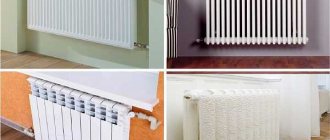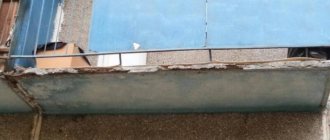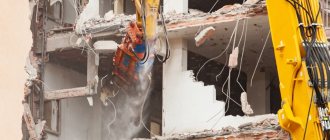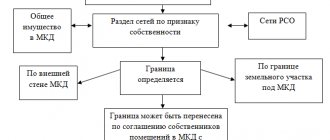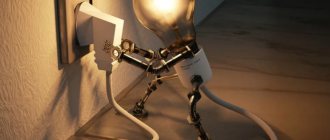Replacing heating batteries in an apartment can entail a number of significant costs. Many homeowners in apartment buildings (hereinafter referred to as MKD) know this. If we talk about the fact that even heating radiators located inside apartments can belong to common property, then not every person knows about this.
In certain situations, the apartment owner does not have to change batteries at his own expense. Their timely replacement and maintenance in proper condition, elimination of leaks and other problems may be the responsibility of the management company (hereinafter referred to as the management company). Moreover, unauthorized replacement of batteries can be considered by law a violation of the rules for using residential premises in an apartment building, which entails a fine of up to 1.5 thousand rubles (according to Article 7.21 of the Code of Administrative Offenses of the Russian Federation).
We will talk about these and other features of replacing heating batteries in an apartment in this article.
Whose property are apartment radiators and pipes?
Heating radiators inside apartments in multi-unit apartment buildings may be classified as common property. This is regulated by the following legislative acts:
- Housing Code of the Russian Federation - see Article 36, Part 1.
- Civil Code of the Russian Federation - see Art. 290 part 1.
- RF PP No. 491 dated 08/13/2006 introduced into the rank of a legislative act the Rules for the maintenance of common property in MKD - see paragraphs 5 and 6 of these Rules (hereinafter referred to as the Rules for the operation of MKD).
In all of these acts of legislation, it is noted that radiators/heating radiators inside an apartment are classified as common property when they are part of a common system and serve more than one room.
If there is no shut-off valve on the riser in your apartment that allows you to disconnect the radiator from the general heating system, this is common property, and its maintenance in proper condition is the responsibility of the management company.
If there are shut-off valves on the pipes in front of the battery, repairing leaks in the central heating system radiators themselves or replacing them with more modern equipment is the responsibility of the homeowner. In this case, radiators will not be classified as common property - this is stipulated in paragraph 5 of the Rules for the Use of MKD. This section states that common property is everything that is located up to the shut-off valve (jumper) on the pipe outlet from the riser to the battery.
Paragraph 6 of the Rules states that the control and shut-off valves themselves are common property , which means that if there is a leak at the junction of the stop valve and the radiator, the management company must also fix the problem at its own expense.
If there is no shut-off valve from the heating riser towards the battery, replacing them yourself is prohibited (who should replace the heating risers in an apartment?). This can lead to an emergency, and will also entail a fine and, possibly, a requirement to dismantle illegally installed equipment.
Normative base
All economic and legal relations are regulated by the Housing Code. The Code is periodically updated with legal acts.
Resolutions adopted:
Disposal of common property
Owners of apartment buildings need to choose the type of management. It is determined by a general meeting at which the owners come to a common opinion.
There are three farming options:
- Management Company. This is a legal entity that manages the household (technical and sanitary maintenance). If residents choose this option, they should enter into a contract of 1 to 5 years. For improper performance of duties, the company is responsible in accordance with Articles 161-162 of the Housing Code.
- Associations or HOAs. The owners register their association as a limited liability partnership and can manage the house either independently or by involving other forces.
- Apartment owners. The number of participants is up to 30 people. In this option, each participant enters into a contract with a resource supplying institution, after which he will become responsible for non-payment of utility bills of his neighbors.
Who manages the property?
Every apartment owner has the right to dispose. Owners have the right:
- keep a bicycle or stroller on the landing;
- grow indoor flowers;
- those who live on the first floors can improve the area under the window;
- other rights.
Share
Any owner has the right to use common property. Ownership rights to any specific piece of land are not assigned to anyone. The owner's right of ownership is proportional to the size of his apartment.
A reduction in the volume of common areas occurs only if all apartment owners agree to this. The issue is resolved at the meeting.
The list of the Housing Code includes:
- An area not included in the area of the apartments. These are stairs, stairwells, attics, basements, corridors and elevators. The list also includes technical floors. Even if it is included in the category of non-residential premises, for example, it was sold as a store, it still refers to common property (in accordance with paragraph 1.1 of Article 36).
- Other premises that do not belong to the apartment owners.
- Equipment used to service two or more apartments (roofing, chimneys, etc.);
- Land related to the house (parking lots, playgrounds, etc.).
The above objects are classified as common property.
Balcony
To figure out what is considered your property and what is not, you should refer to the Housing Code.
Article 36 of the Housing Code states that load-bearing and other elements of a building, if they serve more than 1 room, are considered common to the building.
For example, a balcony slab will be considered common to the house, but the railings, glass and the like will belong to you. A roof is recognized as a common roof if it is included in the design of the house; if it was made by the owner of the apartment, then it is his property.
Heating riser
Clause 6 of Resolution No. 491 recognizes the riser as a common property.
This is important to know: The cost of pension points in 2021 and what they mean
Heated towel rail
This is part of the water supply, but it also may not be a common one. If there are no shut-off valves on the branch to the coil, this is common property. The management organization is responsible for it. If there are taps, then only the outlet is considered common.
Riser
Resolution 491 has a clause about it. Where the first junction with the drain into the sewer is located, the common property begins.
Repair
The list of repair work includes:
- sealing seams and joints of the house;
- correction of deformations of the foundation and rafter system;
- restoration of door and window fittings;
- reconstruction of flooring;
- organize repairs to common areas of the house (staircase, porch, etc.);
- elevator repair;
- correcting problems in the sewer, heating and water supply systems, as well as ventilation;
- putting the electricity supply in order (this does not include the electricity supply located inside the apartments);
- repair of special technical equipment;
- reconstruction of damaged areas (sidewalks, playgrounds and sports grounds, garbage containers, etc.).
Cleaning
- Cleaning of the territory, if the house is serviced by a third party, occurs in accordance with the contract.
- By law, management organizations must take care of:
- sanitary and hygienic condition of the entrance (this includes landings, windows, etc.);
- ventilation.
Examples of work to maintain cleanliness:
- cleaning the entrance (dry and wet);
- window and wall care;
- maintaining mailboxes, railings, doors, etc.;
- cleaning utility rooms and other utility rooms;
- watering areas adjacent to the house (in summer);
- maintaining the roof (clearing debris, leaves, etc.);
- flushing heating systems;
- seasonal disinfestation, deratization.
In relation to stairs, the organization must ensure:
- wet and dry cleaning (washing at least once a month, wiping railings, mailboxes, etc. once a week, walls - 2 times a month);
- good glazing and lighting;
- fittings on doors and windows must be of proper quality.
If residents are dissatisfied with the quality of the work being carried out, they have the right to contact their management organization. She will have to take measures to correct the situation. If the company does not make concessions, you can contact a commission that will verify the proper performance of duties, or terminate the contract with the management organization.
If someone damaged common property, he falls under Article 7.17 “Destruction or damage to someone else’s property,” since there is no separate article for such actions.
If the person who damaged the property is not found in the house, you will have to contact the management company. The procedure for correcting damage requires a written request.
If the identity is known, you need to contact the regional housing inspectorate to which your home ownership belongs. The complaint must be made in writing.
When concluding an agreement between residents and the management company, liability clauses are usually prescribed. Each owner has the right to receive a personal copy of the agreement. The law also regulates the company's activities.
The management organization may not carry out repair work if:
- Damage caused by homeowners or due to the inaction of residents.
- Fire, vandalism and other incidents that occurred through no fault of the company.
- Improper use.
- Unsuitability of structures and utilities when residents did not carry out major repairs.
Use and maintenance of common property
Owners' funds are used to maintain the proper condition of common property. Payment receipts contain the line “ONE” - general house needs. To keep the house in order, it is necessary to carry out certain procedures on an ongoing basis. The line is paid depending on the meter readings.
The money of all owners is used for general house needs, so neither the HOA nor the management company can independently use the property. An exception will be if someone has confirmation of the general meeting of residents. This document is drawn up in accordance with the law.
Transfer of property for free use is possible if all residents have given permission. And for renting out, it is necessary that 2/3 of the tenants agree. If the property is rented out, funds are distributed according to the share of ownership.
Other moments
If something, for example a letter in a surname, is entered incorrectly, it will not be possible to prove the fact of participation in the general meeting. If the other participants make a decision that does not suit you, you will not be able to do anything, because you will not have a voice. Therefore, when signing documents, you must study them very carefully and check every letter.
Who should do maintenance and repairs and when?
According to the above standards, the repair and replacement of heating appliances related to common property is the responsibility of management companies , whose property is the entire heating system in the house, if this heating network does not have boundaries within the apartments (shut-off valves).
The article “Maintenance and repair of common property” can be found in the receipt for payment of services, according to which the owners of apartment buildings pay a monthly fee for the maintenance of this property (how is the heating fee determined?). The management company should seek funds for the repair and replacement of batteries and other communications included in the heating system from this fund.
We figured out who should do the repairs. Now let’s talk about when such equipment should be changed or repaired. In case of emergency - immediately.
The homeowner should not pay for these services to plumbers or other persons.
The issue of replacing radiators is more complicated. Here you should rely on GOSTs and other standards that determine the service life of batteries.
Getting permission
Before you begin replacing radiators, you should obtain permission from the management company to carry out such work. To do this you need to provide:
- statement;
- registration certificate of the premises where the replacement will be carried out;
- title documents for the apartment;
- certificate that the contractor is included in the Unified State Register of Legal Entities.
It usually takes about 2 months to review documents. After this, permission is signed to turn off the riser and drain the coolant from the heating system. The document specifies the time and maximum duration of the work.
How long is the service life according to GOST?
The scope of production and operation of batteries is regulated by GOST 31311-2005 and SP 60.13330.2012. They indicate the service life of heating devices, depending on the materials from which they are made:
- cast iron lasts 25-35 years;
- bimetallic – 25-30 years;
- aluminum – 20-25 years;
- steel - 15-20 years.
By finding out which radiators heat your apartment and when they were installed, you can understand whether it is time to replace them.
If the batteries cope with heating the room, maintaining the temperature in the apartment from +18 ° C, do not leak and do not have other defects, the management company may refuse to replace them even if their service life has expired.
Representatives of the management company can assess the condition of the heating batteries. As a result of the inspection, the commission will draw up an act in which the necessary recommendations will be given. If it is recommended to replace radiators that are common property, you can write an application for these manipulations to be carried out by the management company itself.
What is included?
The common property includes:
- Common areas not included in apartments. Namely, basements, attics, stairs, etc.
- The area adjacent to the house is with green spaces.
- Roofing and its components.
- Enclosing and load-bearing structures.
- Doors and windows located in common corridors.
- Public utility networks, as well as various equipment located within the property.
- Other objects intended for operation, improvement, and also for home maintenance.
It is noteworthy that the inclusion of some elements in the list of common property may be in question. In particular, this applies to the intercom. Turning to the standards, you can understand that the intercom is still classified as joint property. At the same time, the decision on its maintenance is within the competence of the residents.
At whose expense is it possible to replace old radiators with new ones?
The management company must replace old batteries with new ones if they do not have shut-off valves and cannot be “cut off” from the general system with their help. The radiators themselves must also be paid for by the management company, since the new equipment will become their property.
In practice, management companies often refuse to buy, replace or repair heating devices at their own expense. This is the basis for going to court.
Throughout the country, there are known cases of such disputes being resolved in favor of homeowners.
If there are shut-off valves in the heating system, then you will have to replace the batteries at your own expense. But it still won’t be possible to do without the participation of the management company. The rules for operating MKD establish (see clause 5.2.5) that it is necessary to obtain permission to carry out these actions. In addition, you can only choose the right batteries by consulting with management specialists.
Before replacing batteries, you need to conduct an examination and calculate which radiators you need to buy (how many sections, etc.). The examination, if the heating devices are not common property, is also paid by the apartment owner. There is no need to make changes to the technical passport - replacing batteries is not a redevelopment or refurbishment if they are installed in the same places where the old ones were.
Main menu
But this is all ideally, according to a book, according to a textbook. What is happening in reality?
In reality, the circulation line, on which the heated towel rails are located, causes a lot of trouble and headaches for both the heat supply organization and the organization serving the house (most often this is the management company). The fact is that through the circulation line (read - through heated towel rails) overheating occurs through the return pipeline.
And overheating is a direct loss, especially for the resource supply organization. Overheating, in turn, occurs due to non-functioning DHW temperature regulators.
I wrote about this in. That is, water enters the hot water system much higher than required according to the standard, and returns through heated towel rails to the return line also higher than required for the return coolant according to the temperature schedule. This results in overheating of the return.
How to change or repair a heating device for free through the management company / housing office?
So, you live in an apartment where the heating appliances that are the property of the management company are long overdue for replacement, or you purchased housing on the secondary market and are faced with such a need. Just one desire is not enough - the legality of the requirements for free replacement of batteries must be proven - the service life has expired, or the batteries cannot cope with heating the apartment, do not provide the required temperature, have defects, etc. (find out the temperature schedule of the central heating supply according to GOST and water heating standards in heating system radiators can be found here).
In order to officially repair or replace radiators through the Housing Office, there must be a reason. The algorithm of actions must be specific if you want to achieve your goal without damaging your own nerves and wasting extra time. All applications must be submitted in writing . Instructions on how to obtain free replacement or repair of heating devices in an apartment are given below.
Where to contact?
- First, contact your management company to conduct an examination and draw up a report on checking the temperature in the apartment or analyzing the condition of the heating radiators.
- Based on the recommendations given based on the results of the examination, submit a written application to the Criminal Code to replace the batteries (in two copies - on yours the employee receiving the application must put the entry number with the date of acceptance and a legible signature).
If the management company fulfills its obligations, the issue is resolved; all that remains is to wait for the batteries to be repaired/replaced.
If the management company evades its obligations, a complaint should be filed.
After making a claim, as in the case of an application, bring two copies. Yours should contain all the same data:
- incoming number;
- date of;
- signature of the employee who accepted the document.
You should go to court only after directly contacting your management company with an application for repair/replacement of batteries. Perhaps representatives of the Criminal Code will accommodate you and you won’t have to contact other authorities. Going to court is only after sending a written complaint to the Criminal Code. Failure to comply with the requirements set out in the complaint will be the basis for the claim.
Required documents
When submitting an application to the Criminal Code for a free replacement of heating devices in an apartment, you need to add to this document a report drawn up by specialists on measuring the temperature inside the apartment or examining the condition of the batteries - a document confirming the validity of your request. You can’t do without a certificate of ownership of the apartment. You can also attach receipts for no arrears on utility bills.
Drawing up an application
An application for free replacement or repair of heating batteries should be written to the head of the management company. The application must contain the following subparagraphs:
- the header indicates to whom the application is addressed, the full name and position of the person, as well as from whom it comes - your full name, address and telephone number for contact;
- write to ;
- provide complete information about the situation, describe the essence of your request, based on legislative acts.
In addition to the above standards regulating the legality of citizens' demands for free replacement of heating batteries, we can mention the Housing Code (for example, Article 161, which describes the responsibility of the management company to manage apartment buildings in such a way that it provides residents with comfortable and safe living conditions), Rules for the provision of utility services, approved RF PP No. 354 of May 6, 2011 (lack of maintenance of heating equipment violates the provisions of these Rules).
The statement must describe the problem in as much detail as possible, but without unnecessary words or emotional overtones.
Do not write threats or insults under any circumstances - this will not help matters. The essence of your requirements should be extremely clear, the style of presentation should be businesslike.
Be sure to indicate at the end of the application what actions you will take if the request is not granted. It is better to combine this information with the phrase: “If the requirements set out in this application are not met, I reserve the right to contact ....” At the end, you must indicate the date the application was drawn up, sign and your surname with initials.
If you find it difficult to write a statement on your own, or immediately want to present the information as convincingly as possible, then a lawyer with experience in handling cases in the public utility sector will help you draft it correctly.
We do not recommend completing the documents yourself. Save time - contact our lawyers by phone:
8 (800) 350-14-90
Duration of the procedure
The law does not establish deadlines for replacing heating appliances. In emergency situations, safety measures must be taken immediately. How long the resolution of the issue may take, if there is no urgent need, depends only on your management company.
To reduce the time required to resolve the issue, the application can indicate the time interval for performing the work; it is better to start from the beginning of the heating season (“... I ask you to replace the batteries with new ones / carry out repairs before the start of the heating season .. year”). During the heating season, without emergency reasons, it will be difficult to obtain free work.
If it comes to filing a claim, it is necessary to indicate the deadlines for fulfilling your requirements. If the issue is resolved by the court, the time frame will be set by this body.
What difficulties with the law may arise if you carry out the work yourself?
Replacing batteries in an apartment yourself is fraught with:
- disturbance of heat exchange in the house;
- emergency situations;
- fines.
If you replace the batteries without permission, then in case of any accidents, the owner of the apartment will pay for damage to property. Moreover, not only to neighbors, but also to the management company.
Batteries that do not belong to the property of the management company can be replaced only after receiving written permission.
It is better to entrust the work to the employees of your management company, since in further emergency situations they will be responsible for violations in the operation of the heating system of the house. Third-party organizations will not be able to provide the homeowner with legal protection in the event of accidents, including those that arose through no fault of the homeowner.
You may be interested in looking at other articles about heat supply rules, commercial heat energy metering, types and costs of major and other types of repairs of heating systems in an apartment building, heat metering devices, heating season schedule in 2021, reasons for turning off heat supply in an apartment and noise in batteries, temperature charts and water heating standards in heating system radiators, as well as what to do if the battery leaks.
What is included in the common property of an apartment building under the Housing Code of the Russian Federation
Have questions? Consult a lawyer (free of charge, 24 hours a day, seven days a week):
8 Moscow and Moscow region.
8 St. Petersburg and Len. region
Common property - this phrase is familiar to all homeowners who pay monthly housing and communal services bills. But few people really understand what it means and what money is paid for on payments. What property is included in the list of common property, whether it can be used, what part belongs to each tenant - all this can be understood by carefully studying the section of the Housing Code of the Russian Federation “Common Property of an Apartment Building”.

